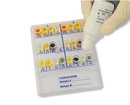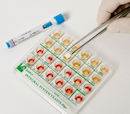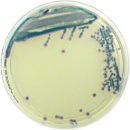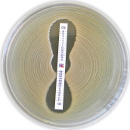
Pesticides have been
associated with everything from cancer and infertility to Gulf War
syndrome and eye abnormalities and, in many cases, there is solid
evidence to back this up.
For this reason, some countries have banned the use of certain pesticides in food and safety levels have been set for others which are deemed to protect the public.
However, the jury is still out on the risk of consuming many pesticides on a long-term basis.
Why the concern?
Pesticides are poisons, so in themselves they are dangerous. However, farmers count on the levels used to kill insects being low enough not to affect humans.
So the main health fear associated with pesticides is not that someone will eat a sprayed apple and get cancer, but that residues will build up over the years and cause disease to develop slowly.
Because such an effect is so long-term, it is difficult to prove it is happening, but many people prefer not to risk exposure to pesticides and opt for organic foods.
What are "hormone disruptors"?
A number of pesticides which are commonly found in our food have been identified by the European Union as likely to cause disturbance to natural hormones in our bodies.
These "hormone disruptors" can affect behaviour, brain development and development of reproductive organs.
They have also been linked to such as falling sperm counts and girls entering puberty earlier.
Hormone disruptors can cause problems at very low doses. Some block the bodies natural hormones from working, while others mimic the action of natural hormones.
Is there a risk to children?
Some scientists believe exposure to pesticides in the womb may be to blame for the growth of behavioural disorders among children in industrial countries.
They also suspect that subtle harm done to the brain early in life may not become evident until much later.
Some pesticides have been found to weaken the immune system, and concern has even been raised that exposure to pesticides in the womb could make individuals more vulnerable to their toxic effects as adults.
What protection is there?
The government sets a maximum residue level (MRL), what it calls an "approved usage" level of a pesticide - essentially a safety limit on how much can make its way into the food chain.
The September 1999 report from the Working Party on Pesticide Residues found pesticides in many supermarket foods, but only a small proportion breached the limits.
However, the approved usage level is set down for adults, potentially putting children at risk.
Barbara Dinham, programme director of the Pesticides Trust said: "Children tend to eat a lot of fresh fruit and vegetables and there is the worry that they could be more at risk, especially as there are more pesticides in food now, so they are growing up accumulating these chemicals."
What are the prime suspects?
Research has identified several pesticides that pose a risk to health over a prolonged period and even with small-scale exposure.
Chlordecone: Leads to abnormal sperm and affects their ability to move.
Vinclozalin: Another hormone disruptor used on oilseed rape, apples, peas and beans, has been shown to cause serious developmental problems to baby male rats.
Carbendazim: The the most commonly used fungicide in the UK. It has been shown to disrupt sperm production in the testicles of adult rats, and to damage the development of mammels in the womb.
Lindane: Linked to breast and other cancers, and fertility problems.
DDT: Linked to cancer and male infertility after it was shown to block the action of male hormones. Banned in the developed world, and the UN Environment Programme is trying to push through a worldwide ban on the hazardous chemical, but malaria specialists have campaigned against this, as DDT is used to kill the mosquitoes that carry the disease.
Organophosphates: Those used in sheep dip have been linked to excessive tiredness, headaches, limb pains, disturbed sleep, poor concentration, mood changes, and suicidal thoughts.
Copyright © 2024 Liofilchem® srl - All Rights Reserved






















